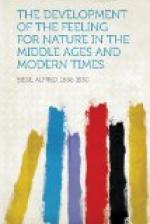Roll on, thou deep and dark blue Ocean—roll!
Ten thousand fleets sweep over thee in vain;
Man marks the earth with ruin—his control
Stops with the shore; upon the watery plain
The wrecks are all thy deed, nor doth remain
A shadow of man’s ravage, save his own,
When, for a moment, like a drop of rain
He sinks into thy depths with bubbling groan,
Without a grave, unknell’d, uncoffin’d, and unknown.
(Childe Harold.)
The day at last has broken.
What a night
Hath usher’d it! How beautiful in heaven!
Though varied with a transitory storm,
More beautiful in that variety!...
And can the sun so rise,
So bright, so rolling back the clouds into
Vapours more lovely than the unclouded sky,
With golden pinnacles and snowy mountains,
And billows purpler than the ocean’s, making
In heaven a glorious mockery of the earth.
(Sardanapalus.)
He had loved the Scotch Highlands in youth:
Amidst Nature’s native scenes,
Loved to the last, whatever intervenes
Between us and our childhood’s sympathy
Which still reverts to what first caught
the eye.
He who first met the Highlands’
swelling blue
Will love each peak that shews a kindred
hue,
Hail in each crag a friend’s familiar
face,
And clasp the mountain in his mind’s
embrace.
(The
Island.)
and in The Island he says:
How often we forget all time, when lone,
Admiring Nature’s universal throne,
Her woods, her wilds, her waters, the intense
Reply of hers to our intelligence!
Live not the stars and mountains? Are the waves
Without a spirit? Are the dropping cares
Without a feeling in their silent tears?
No, no; they woo and clasp us to their spheres,
Dissolve this clog and clod of clay before
Its hour, and merge our soul in the great shore.
(The Island.)
Byron’s feeling was thus, like Goethe’s in Werther and Faust, a pantheistic sympathy. But there was this great difference between them—Goethe’s mind passed through its period of storm and stress, and attained a serene and ripe vision; Byron’s never did. Melancholy and misanthropy always mingled with his feelings; he was, in fact, the father of our modern ‘world-pain.’
Still more like a brilliant meteor that flashes and is gone was Shelley, the most highly strung of all modern lyrists. With him, too, love of Nature amounted to a passion; but it was with her remote aerial forms that he was most at home. His imagination, a cosmic one, revelling among the spheres, was like Byron’s in its preference for the great, wide, and distant; but unlike his in giving first place to the serene and passionless. As Brandes says: ’In this familiarity with the great forms and movements of Nature, Shelley is like Byron; but like him as a fair genius is like a dark one, as Ariel is like the flame-bringing angel of the morning star.’




